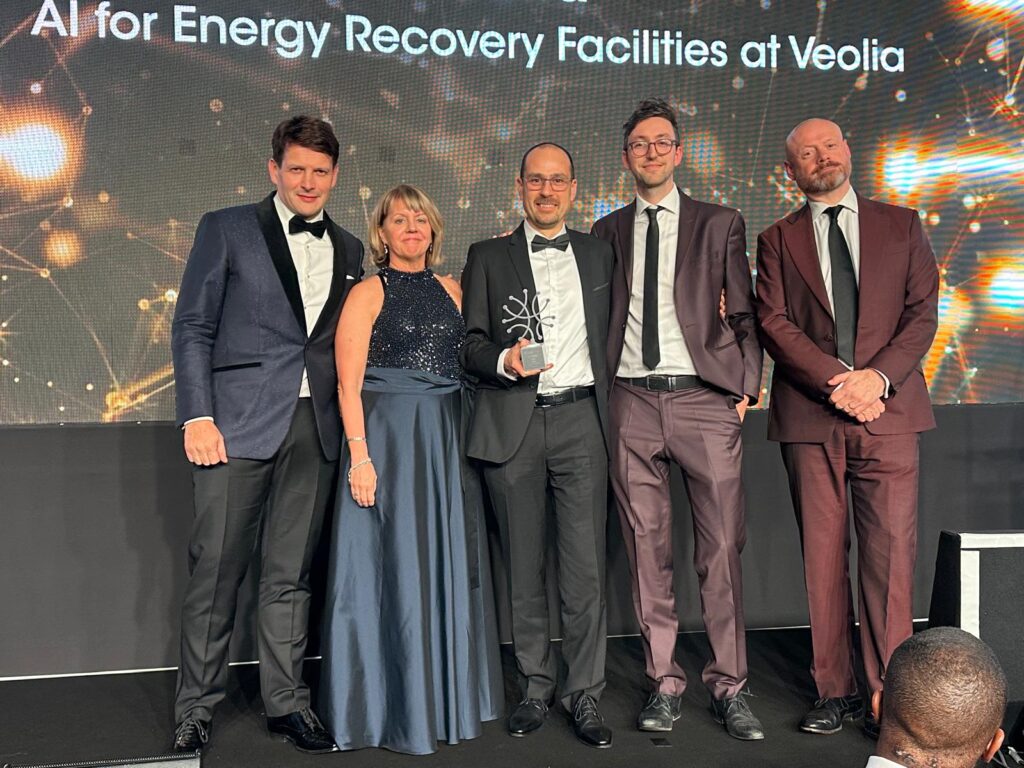At Veolia, the operational performance of Energy Recovery Facilities (ERFs) is both a competitive differentiator and a growing challenge. With shorter, more competitive contracts and increasingly complex processes, traditional manual analyses could no longer keep pace. Veolia responded with an ambitious AI project developed jointly by its Digital Business & Technology, Business Support & Performance, and local operational teams that redefined how performance data is analysed, monitored, and acted upon.
For its ability to combine advanced AI with operational reality, and to deliver both financial and cultural impact, Veolia has been named the winner of Breakthrough with Data or AI at the 2025 DataIQ Awards.
“What makes this entry stand out is its holistic impact: operational excellence, cultural transformation, and competitive advantage in tenders.” – Judges’ comments
Tackling Complexity with AI
The project was designed to address two major obstacles: the sheer number of factors influencing plant performance, and the lack of standardisation in monitoring across the group.
The solution integrates three AI-powered modules:
- Steam performance monitoring, isolating and analysing variables like waste humidity, weather, and process settings to detect deviations early.
- Electrical production monitoring, providing real-time oversight of turbine efficiency.
- Boiler fouling analysis, enabling smarter cleaning cycles to prevent costly unplanned shutdowns while protecting equipment.
These modules, accessible through a centralised application, represent a technological breakthrough: they process multidimensional data in real time, link operational systems holistically, and create a foundation for further expansion into more complex use cases.
Rapid Deployment and Adoption
What distinguishes Veolia’s approach is the speed and inclusivity of its execution. In less than a year, the solution was piloted at eight plants across four countries. Today, collaboration has extended to 18 sites, with ambitions to scale to all 70 globally.
The rapid adoption (over 40 active users by December 2024) was achieved by embedding operators in the design process. Data scientists worked closely on-site, producing prototypes within six weeks of engagement. The emphasis on intuitive interfaces, transparent AI techniques, and clear financial impact ensured trust and enthusiasm among users.
Driving Excellence and Culture
The financial benefits are undeniable: increased capacity, optimised shutdown schedules, and improved turbine performance, without any major technical changes to the plants themselves. But equally important is the cultural shift. Operators are now empowered to manage complexity with confidence, supported by AI-driven insights. Best practices can be standardised across geographies, reinforcing operational excellence and embedding a truly data-driven culture.
Strategic Advantage and Future Vision
Beyond immediate results, the AI initiative strengthens Veolia’s competitive position. The ability to demonstrate tangible efficiency gains has already proven decisive in winning new tenders. Meanwhile, the roadmap is ambitious: equipping half of all global ERFs with the system by the end of 2025, extending into 46 identified use cases, and integrating new technologies such as Generative AI through its partnership with Mistral AI.
A Worthy Winner
The judging panel praised Veolia for turning industrial data into a transformative lever for both performance and culture. By combining rapid, collaborative deployment with cutting-edge AI, the company has demonstrated not only technical innovation but also organisational impact. For proving that AI can deliver measurable gains in one of the most complex operational environments, Veolia is the 2025 winner of Breakthrough with Data or AI.





